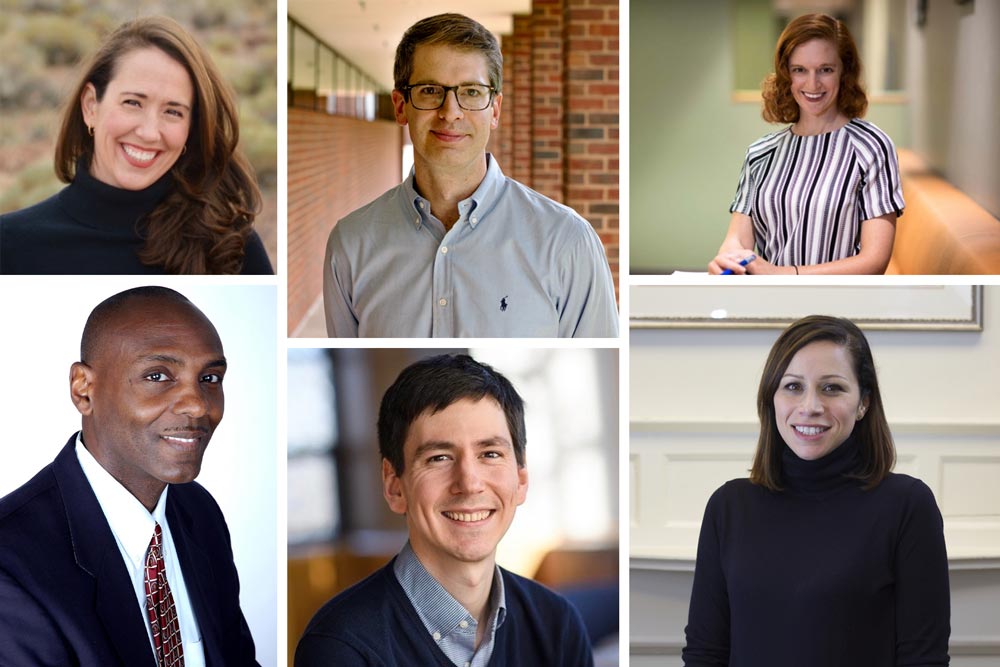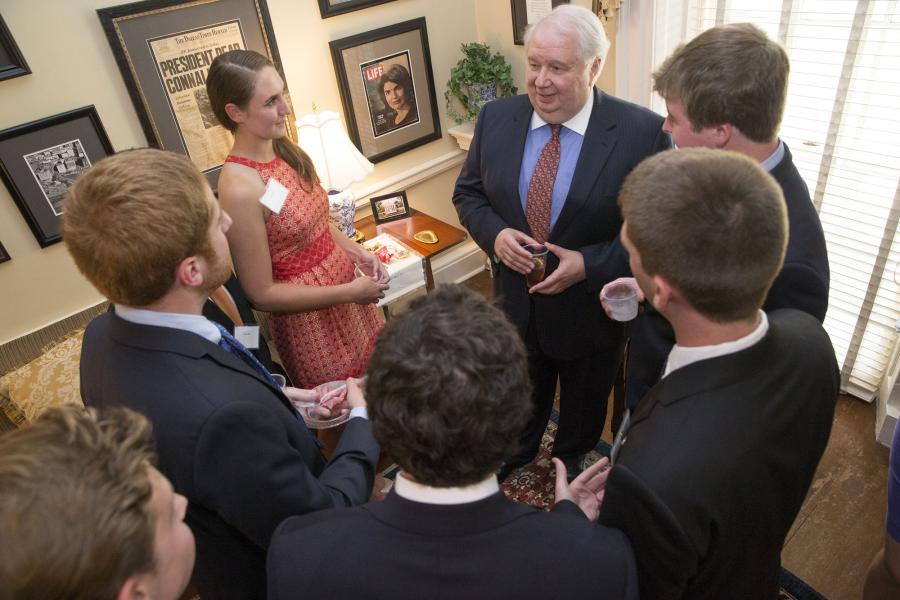The President and Provost’s Fund for Institutionally Related Research announced its third round of awards to support faculty research that shows potential to benefit the University of Virginia community.
Launched in 2020, the seed fund supports UVA faculty researchers who design projects to improve life and learning at the University, especially for students. Proposals also support key elements of the University’s strategic plan, “A Great and Good University: The 2030 Plan.”
The fund is designed to provide initial support to launch projects that can either be completed with one-time funding, or, if they will require a larger investment, have the potential to attract longer-term funding from federal agencies, private foundations and other sources. The fund has an annual pool of $700,000, with a cap of $200,000 per award.
“We are thrilled to offer support to six proposals this year, tripling the number of awards from each of the past two rounds,” President Jim Ryan said. “While selecting only some of the competitive proposals that we receive is challenging, Ian and I are impressed with the potential that these projects have to benefit the UVA community.”
Provost Ian Baucom added, “The projects selected for this round of funding all share a deep desire to reach students where they are – in classrooms and dorm rooms, and as citizens and future leaders. Feeling a sense of belonging and welcome has been a recurring theme for students this year, chiefly as we emerge from the COVID-19 pandemic, and I am delighted to see faculty members dedicating their thought and work to improving student learning and experience through this research.”
This year, 16 submissions were nominated by deans on a variety of topics from schools across Grounds. The six recipients:

- Jennie Grammer, Stern Bicentennial Associate Professor in Education and Neuroscience. Grammer’s proposal, “Using Neuroscience in Real-World Settings to Improve Student Attention and Engagement,” aims to optimize student learning experiences through neuroscience data. The project team will observe and analyze instructors and students using a combination of electroencephalography and methods identified by UVA’s Center for Teaching Excellence to improve student attention and engagement in class. The project’s effort to monitor brain function in classroom settings will ideally help instructors know which conditions set their students up for success.
- Rose Buckelew, Assistant Professor of Sociology. Buckelew’s project, “Innovating an Equity-Minded Approach to Soliciting and Incorporating Student Feedback to Improve Sense of Belonging,” aims to explore UVA’s use of student evaluations of teaching by crafting a standard tool for instructors to use when gathering student feedback. Buckelew’s research team will use both qualitative and quantitative methodologies and analysis to develop the tool and ultimately enhance transparency and equity and increase high-quality course feedback. Once it is put into practice, the project team’s tool would give instructors a greater understanding of a wider variety of student needs and viewpoints, which will assist them in adjusting their courses for future generations.
- Peter Johannessen, Assistant Professor of Public Policy. In “Hoos Learn Together: Increasing Sense of Belonging in Large-Enrollment Courses,” Johannessen will observe teaching methods at UVA to identify small, but high-impact interventions that boost student engagement, particularly in large-enrollment course settings. Johannessen’s project team aims to enhance positive student connections with faculty and strengthen students’ sense of belonging, a key component of success.
- Garrick Louis, Associate Professor, School of Engineering and Applied Science. In collaboration with 100 Black Men of Central Virginia and Hampton University, Louis’ project goal is to attract low-income, minority students and/or first-generation students to UVA, diversifying the science, technology, engineering, and math – or STEM – fields of study. Entitled “UNITED - Using Normalizing Immersions for Transition to Educational Diversity,” the project will open opportunities for prospective underrepresented students in grades five through 12 to visit the University and participate in hands-on lab tours, discussions with instructors and workshops on social justice in STEM. Enrolled students from Hampton and UVA will participate in the project and work with the middle and high school students. The project aims to build trusting relationships between underrepresented student groups and the University and offer both incoming and enrolled students a sense of welcome and opportunity.
- Brian Wright, Assistant Professor, Director of Undergraduate Programs, Director of Collaboratory for Education and Data Science. The data science field is new and rapidly growing. Wright’s project goal is to develop a “Data Science Active Learning Lab,” which will allow faculty and graduate students to collaborate on developing and testing data science coursework and active learning approaches. The project will identify best practices in the budding data science field and cultural norms for teaching underrepresented and/or first-generation students in data science that can be shared as standards for the field within and outside of the University.
- Rachel Wahl, Department of Leadership, Foundations, and Policy, School of Education and Human Development; and Melody Barnes, Executive Director of the Karsh Institute of Democracy. Titled “Is the Good Life Political? Civic Engagement, Ethics and Student Well-Being,” Wahl and Barnes’ research focuses on the past, present and future of the civic and political engagement of young people and its correlation to their well-being. The research team will engage faculty members on Grounds, conduct a public dialogue with community colleges on civic engagement and its effect on students with financial and caretaking responsibilities, and ultimately, develop new coursework and programs on the topic of civic engagement and its connection to student well-being.
In the 2020 inaugural round of the program, the fund supported two initiatives: one to study the “Hoos Connected” program and another to launch “eGlobal UVA.” In 2021, two initiatives rose to the top of applications. The first, led by Bethany Teachman, a professor of psychology in the College and Graduate School of Arts & Sciences, developed and tested an online, app-based “Hoos Think Calmly” approach to deliver personalized, context-relevant, mobile interventions for UVA students, faculty and staff. The second, led by Karen Inkelas, an associate professor of education, aimed to promote belonging and academic success among underrepresented students at UVA.
The President and Provost’s Fund for Institutionally Related Research accepts proposals each year. In general, the fund supports projects involving research related to improving the quality of life and learning for members of the UVA community, although in some years there is a focus on a particular topic.
Media Contact
Article Information
July 8, 2025


